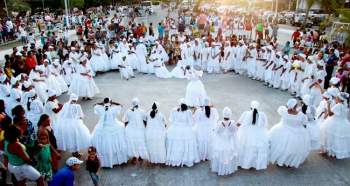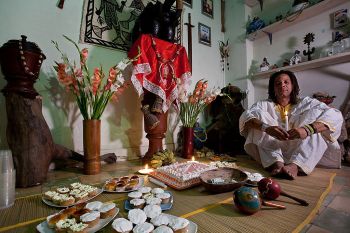Melas commented thoughtfully on the previous post, and I’d like to reflect on his words here. In trying to explore the questions he raises, ultimately I end up pushing hard against my own doubts and understandings and probable prejudices. By this I mean I’m mostly arguing with myself, not Melas. So here goes …
First, Melas’s initial observation:
The poem, though short, is moving, especially upon a reflection, as you have provided. Without considering the poet’s evident meaning or original intention, I’d venture upon a somewhat different interpretation than yours, that is, one based on my traditional views. Let us at least agree that ancestry bears some degree of importance in any tradition of polytheism; the difficult questions are, how much, and what if one is of mixed ethnic ancestry?
I’ll add to Melas’s two “difficult questions” here and make them four: Does ancestry in fact matter, how much, what if one is of mixed ancestry, and does polytheism affect the issue one way or another? (One or many gods, or none, we all have the same energies to work with. Or do we live in wholly different universes simply because we group and name and work with these energies differently?) To continue a theme from the previous post, if we consider a person of Greek descent whose ancestors for at least ten or more generations were most likely Orthodox Christians, is practicing Hellenismos, reconstructed Greek polytheism, a comfortable or straightforward way to find harmony with these most recent ancestors, to enlist their aid, or to maintain their tradition? Or consider the opposite: is the Orthodox Christian angering all those ancestors who preceded Christianity? Is it merely a numbers game?
When I welcome ancestors — the occasionally monotheist, sometimes pantheist, intermittently polytheist being that I am — I invite those sympathetic to me, one of their descendants, today. (Who else, after all, would want to come? Think of those family events you’ve tried to escape!) In this sense, ancestry is indeed everything. I’m here because of them, and with them rest both my gratitude and reverence. But I face choices and challenges both similar to and different from ones they faced. I have ancestors who were Christians, Pagans, atheists, agnostics, animists, polytheists and shamans. How do we sort out such identifications and allegiances?
Do the last thirty generations of so of Christian ancestors of varying degrees of devotion and wisdom trump hundreds of generations and more of pre-Christian ancestors? Will the polytheists among them fight the monotheists in the Otherworld, or at my ritual circle? Does more recent ancestry matter more than the more ancient strains? OBOD’s standard ritual includes a declaration of peace, without which no work can proceed. Those who work the rituals can attest to the power of that declaration, and to the tenor and energy of the rites that follow. What we do, and who we welcome, matter here and now. A feast is ultimately for those who actually attend (though even to be invited is pleasing, too). To paraphrase Jesus, many are called, but fewer are fed.
King’s poem in the previous post acknowledges his
people
back to the beginning of
life,
In the witness of the gods
and the ungods
Back to the beginning: bug and bird, beast and beech tree. I suspect, one of the words I prefer to use in place of believe, because it captures both my doubt and my intuition, that such matters as commitments and practices from one life may recede when we drop the body of that life. We work on what we need to learn. If we truly do experience all things as we move through each circle of existence and awareness, as some Druids teach, then so do our ancestors along their journeys. Some things we give up, even as we take on others. (Some will follow us through many lives.) Whether this time around I was baptized into the “right” church, or offered the traditional gifts to welcome my spirit guide on my vision quest, may matter little compared to our enduring work along the Spiral of all beings to learn and grow in strength and love. And from what I’ve seen, we’re all slow learners. The Spiral is large and long.
Melas comments:
To the first [how much does ancestry matter?], I would say as much as possible, since a connection by blood is an inner force and connection (literally and figuratively) that can’t be replaced easily or dispensed with as unessential. I am not wholly Greek in ancestry, but my ancestors are partly from neighboring nations, and therefore choosing for me is easier than someone half-Greek and half-Chinese. In such a case, it would be best to take a side, I mean join one tradition without scorning the other, since large distance is inconvenient and causes confusion in the mind and heart.
When the choosing is clear, the choice can align the chooser quite effectively within a tradition that can be a solace and a guide, a source of strength and identity. Today many are still born with such a clear ancestral heritage. In such a case, it may indeed “be best to take a side, I mean join one tradition without scorning the other”. Perhaps Americans feel more keenly the “confusion in the mind and heart” that Melas talks about, with our often mixed ancestries. Confusion may result, whether the distance is physical, cultural, linguistic, genetic, spiritual, psychological, etc.
But should I then be a Christian, because everyone in my immediate family was, and because though I’m deliciously mongrel in many ways, most of my more recent Swiss German, English, Welsh, French, and Scottish ancestors were Christian as well? (I have transcripts of letters from one ancestor eight generations back, admonishing her children to strengthen their faith in trying times.) Should I be Catholic, or Protestant, or provoke ire on all sides and practice a blend of Christianity and Druidry?

Candomble ritual, Brazil
And I call to mind people known to me personally, who don’t count among their keys to identity a genetic match in this particular life to a particular tradition that nonetheless calls deeply to them. Is there no place for an Asian or African in an often Euro-centric tradition like Druidry? Most traditions of Druidry I know welcome all who come with good will and an open heart, regardless of DNA. And that feels right to me, and to many others. Does that weaken the tradition, or strengthen it? Or indeed not affect it either way?
What are we to make of those whose inner experiences orient them toward traditions outside their apparent genetic heritage? What of the Euro-American adopted into a Native American tribe? The person of mixed ancestry who practices two or more traditions, a syncretism that seems more the rule than the exception, if we look at human history? Many homes in America find ways to honor a colorful braid of ancestral strands, Latino and Jewish and Thai, Catholic and Native American and Nigerian, etc. Haitians practice Vodoun, and Candomble and Santeria flourish in many places in the Americas — syncretistic forms all of them.

Santeria initiate
What of other new traditions, and restored ones, among people who already have a clear cultural and genetic identity? Native Americans have established the Native American Church, a distinctive set of beliefs and practices blending Christianity and shamanism, with sacramental use of peyote. As a Wise One once quipped, “There is little nature likes so much as to destroy old forms and then create new ones like them”. Do the ancestors of Native tribes ignore their descendants because of this innovation? I suspect — that word, again — that the ancestors either haven’t figured out yet, or worry about it a great deal less than we do.
Melas closes:
This point of the essential connection between ancestors and polytheism is too often overlooked nowadays, and I think it is dangerous. If we don’t stick firmly and mainly to a certain tradition and people (again, without scorning others), we expose ourselves to the uneasiness (sometimes misery) of uncertainty, and further we render traditions unlasting, empty and jumbled by removing distinctions from them.
Does the distinctiveness of a tradition depend on ancestry, or on honoring the ancestors? I see these as different things. I may know next to nothing of my ancestry, or through misinformation and deliberate ancestral deception I may believe things that are inaccurate, but the existence of my ancestors is still indisputable. And what of ancestors of spirit, those who have taught and trained and nourished me though we have no kinship by blood? They matter equally to me and to many others. Are such calls outside our blood the calls of those ancestors?
In the end, I’d argue that the distinctiveness or value of a tradition is simply this: does it meet the needs of those who practice it? Does it nourish the heart and spirit? Does it answer our innermost cry? If it does, it thrives and flourishes: we thrive and flourish in it. If it doesn’t, then like all things in this world, it changes or dies. It may be distinct, but dead. We contain, but also surpass, all that we do. That’s time-bound, however wonderful it is. And we live in more than one world at once, acting in each. But each of us is also still a seed, a potential, waiting in the earth, even as along time’s spiral we fruit and die, sprout again and blossom. The world shows us that much every year.
/|\ /|\ /|\
